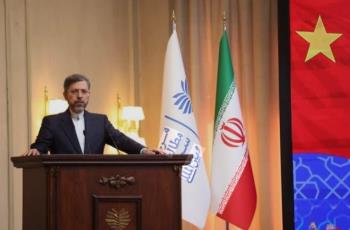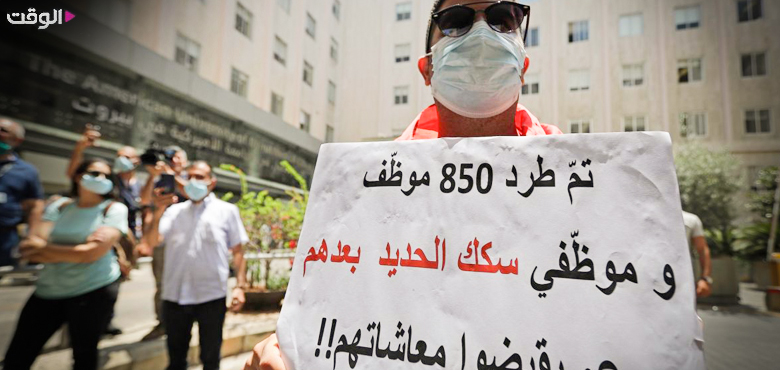Alwaght- Lebanon has been grappling with an array of economic and political problems in recent years, making it have trouble forming governments as the economy continues to suffer. Both foreign and home factors are to blame for continuation of the crisis.
Home factors
Protests at the economic situation in Lebanon reached their climactic point in October 2019, and continued problems, government inefficiency, corruption, hoarding, the explosion of the port of Beirut in August 2020, which caused $10 billion in damage, inability to form a strong government, and lack of an economic plan made the problems snowball, pushing the once-prospering nation to the brink of collapse.
Lebanon's economic situation is currently in a state where the country is going through its biggest economic crisis since the 15-year civil war of the 1990s. The prices of goods and services in the country in the last year alone rose 100 percent. Food prices rose by 4 percent since 2020. The country has been facing severe fuel and medicine shortages, and the internet and power supply have been affected, and unemployment and debt rates have risen sharply, by $90 billion. If the country does not get the emergency $20 billion in aids, it would increasingly move towards the edge of economic collapse.
The coming to power of Prime Minister Najib Mikati, who was approved by the US and France, raised the possibility of resolving the country's economic problems, and in an interview with CNN, he said his main mission was to "stop the collapse of Lebanon and lead the country to the path of settling economic and financial problems."
The diplomatic crisis with Saudi Arabia, the continuation of sanctions against Beirut, and the inability to attract the international financial assistance made Mikati's government fail to make a difference several months after taking the power. In an interview with a local television channel in December 2021, Lebanese President Michel Aoun referred to the economic crisis of the last two years in the country and said: "Lebanon will need 6 to 7 years to get out of the crisis it is in. It takes time. There will certainly be a change in Lebanon, and this change will be on an intellectual and practical level. Because we have reached this status due to corruption and mistakes of the system. It requires change, but we need time to do it."
Lira slump afresh
As the economic crisis began to bite, the national currency lira sharply lost value against the US dollar, dropping 90 percent since 2020. In recent days, the fall of the lira has set a new record, with each US dollar sold for 32,000 lira in the fix market and purchase price at 31,950 lira. Earlier, the lowest price of the Lebanese lira against each US dollar was 25,000 lira.
Actually, with the beginning of the protests in October 2019, the explosion of the port of Beirut, the disagreement of political factions and foreign countries over cabinet and the successive resignations of governments caused the lira to continuously lose value. In addition to the cessation of international aid to Lebanon, the increase in the exchange rate for dollar deposits by the Central Bank of Lebanon, along with the ban on the import of Lebanese goods to some Arab countries have reduced the country's access to the dollar hence causing its price. The lira has also depreciated in recent months after the government decided in November 2021 to increase the price of gasoline, diesel, and household gas in the country, giving the national a new economic shock.
Foreign conspiracy against Lebanon and Hezbollah
Lebanon's current predicament is more a product of foreign meddling in its politics, economic policies, and sanctions than its home factors. The Israeli regime is also pleased with the economic situation in Lebanon and has asked the Arab countries of the Persian Gulf not to help Beirut, not "even a dollar." The banking system's blind implementation of Western-dictated monetary and fiscal policies, along with US and French intervention in the IMF which forced the Lebanese government to cut subsidies for essential goods caused fuel shortages and thus intensified economic pressures.
Meanwhile, Riyadh, more than any other country, has regarded the economic crisis as a special opportunity to put pressure on Beirut. After the reduction of the level of relations between Saudi Arabia and some Arab countries with Lebanon, Mikati and his government's green light to patch things up with the Arab kingdom did not face a positive reaction from the Saudis. In fact, Riyadh has found the crisis a special opportunity for realization of its goals, especially Hezbollah disarmament and its role cut in the Lebanese politics.
These schemes are pursued as Lebanon is dependent on Saudi Arabia for its oil imports, and a embargo on Lebanese products will cause Beirut to lose about $300 million of its revenues as the kingdom is destination of 10 percent of Lebanese goods. In addition, in recent years, Lebanon has been able to use the capacity of Lebanese immigrants working in the Arab countries of the Persian Gulf, especially Saudi Arabia and the UAE, to improve its hard currency reserves. According to the World Bank, 43 percent of remittances sent to this country have been made through the Lebanese expats in the Persian Gulf countries. In such circumstances, and given Saudi Arabia continuing economic pressure on Beirut, this vital artery is being increasingly choked. With the economic crisis going on, the Arab states can expel the Lebanese workers and thus cut the remittances to Lebanon.
A look at recent Saudi stances makes it clear that Riyadh plans to continue this approach against Beirut. The home factors along with foreign restrictions on the country and diplomatic rift with Saudi Arabia make it impossible to clearly see in sight a solution to the Lebanese problems. Additionally, the Lebanese government has not presented a specific roadmap for exit from the crisis, though Mikati with visits to such countries as Egypt is seeking to settle the political crisis, attract international aids and loans, and win waivers from US-imposed Caesar sanctions on Syria to allow gas imports to Lebanon.



























